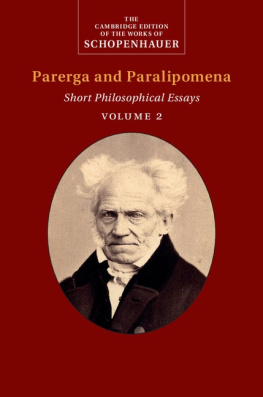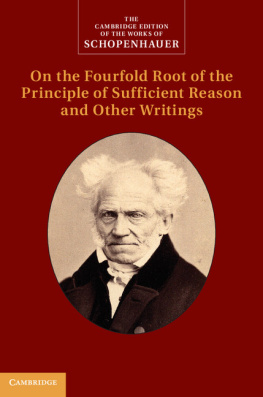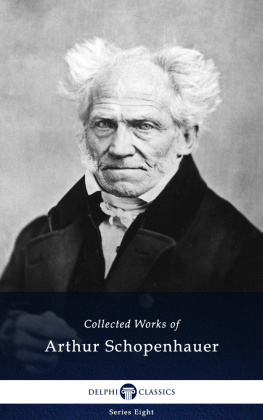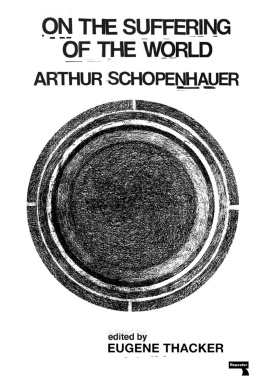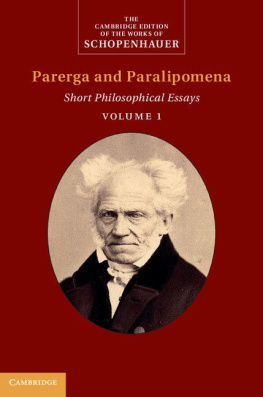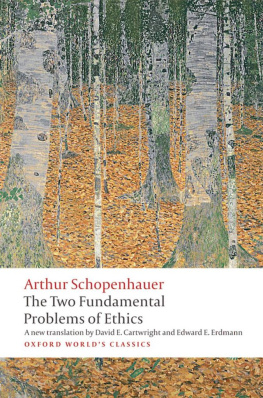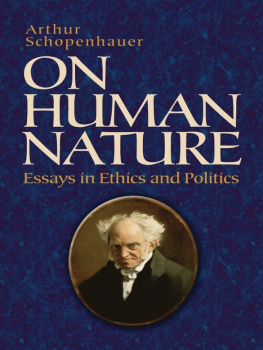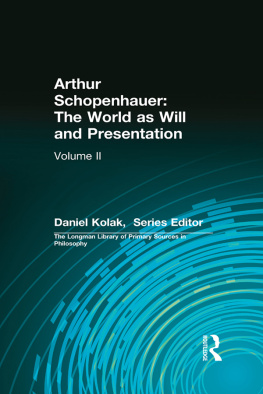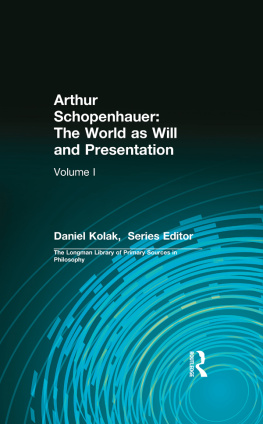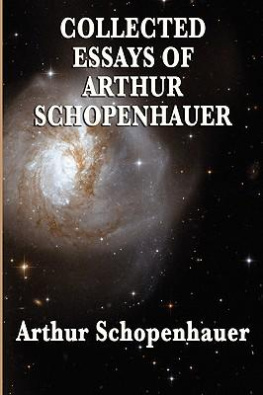Arthur Schopenhauer - Parerga and Paralipomena Vol.2
Here you can read online Arthur Schopenhauer - Parerga and Paralipomena Vol.2 full text of the book (entire story) in english for free. Download pdf and epub, get meaning, cover and reviews about this ebook. year: 2015, publisher: Cambridge University Press, genre: Religion. Description of the work, (preface) as well as reviews are available. Best literature library LitArk.com created for fans of good reading and offers a wide selection of genres:
Romance novel
Science fiction
Adventure
Detective
Science
History
Home and family
Prose
Art
Politics
Computer
Non-fiction
Religion
Business
Children
Humor
Choose a favorite category and find really read worthwhile books. Enjoy immersion in the world of imagination, feel the emotions of the characters or learn something new for yourself, make an fascinating discovery.
- Book:Parerga and Paralipomena Vol.2
- Author:
- Publisher:Cambridge University Press
- Genre:
- Year:2015
- Rating:3 / 5
- Favourites:Add to favourites
- Your mark:
- 60
- 1
- 2
- 3
- 4
- 5
Parerga and Paralipomena Vol.2: summary, description and annotation
We offer to read an annotation, description, summary or preface (depends on what the author of the book "Parerga and Paralipomena Vol.2" wrote himself). If you haven't found the necessary information about the book — write in the comments, we will try to find it.
Arthur Schopenhauer: author's other books
Who wrote Parerga and Paralipomena Vol.2? Find out the surname, the name of the author of the book and a list of all author's works by series.
Parerga and Paralipomena Vol.2 — read online for free the complete book (whole text) full work
Below is the text of the book, divided by pages. System saving the place of the last page read, allows you to conveniently read the book "Parerga and Paralipomena Vol.2" online for free, without having to search again every time where you left off. Put a bookmark, and you can go to the page where you finished reading at any time.
Font size:
Interval:
Bookmark:
Arthur Schopenhauer
Parerga and Paralipomena
The purpose of the Cambridge Edition of the Works of Schopenhauer is to offer translations of the best modern German editions of Schopenhauers work in a uniform format suitable for Schopenhauer scholars, together with philosophical introductions and full editorial apparatus.
With the publication of Parerga and Paralipomena in 1851, there finally came some measure of the fame that Schopenhauer thought was his due. Described by Schopenhauer himself as incomparably more popular than everything up till now, Parerga is a miscellany of essays addressing themes that complement his work The World as Will and Representation , along with more divergent, speculative pieces. It includes essays on method, logic, the intellect, Kant, pantheism, natural science, religion, education, and language. The present volume offers a new translation, a substantial introduction explaining the context of the essays, and extensive editorial notes on the different published versions of the work. This readable and scholarly edition will be an essential reference for those studying Schopenhauer, history of philosophy, and nineteenth-century German philosophy.
Adrian Del Caro is Distinguished Professor of Humanities and Head of Modern Foreign Languages and Literatures at the University of Tennessee. He has published many books, including The Early Poetry of Paul Celan: In the beginning was the word (1997) and Grounding the Nietzsche Rhetoric of Earth (2004). He has published numerous articles in journals including Journal of the History of Ideas, Philosophy and Literature , and German Studies Review . His translations include poetry for The German Mind of the Nineteenth Century (ed. Hermann Glaser, 1981), and The Gay Science (ed. Bernard Williams, Cambridge, 2001).
Christopher Janaway is Professor of Philosophy at the University of Southampton. His most recent books include Schopenhauer: A Very Short Introduction (2002) and Beyond Selflessness: Reading Nietzsches Genealogy (2007). His most recently edited collections include The Cambridge Companion to Schopenhauer (Cambridge, 2000) and Better Consciousness: Schopenhauers Philosophy of Value (co-edited with Alex Neill, 2009). He is General Editor of The Cambridge Edition of the Works of Schopenhauer series, for which he has translated The Two Fundamental Problems of Ethics (2009) and co-translated three other volumes.
Christopher Janaway
Arthur Schopenhauer
Parerga and Paralipomena
Short Philosophical Essays
Volume 2
Translated and Edited by
Adrian Del Caro
Christopher Janaway
with an Introduction by
Christopher Janaway


University Printing House, Cambridge CB2 8BS, United Kingdom
Cambridge University Press is part of the University of Cambridge.
It furthers the Universitys mission by disseminating knowledge in the pursuit of education, learning and research at the highest international levels of excellence.
www.cambridge.org
Information on this title: www.cambridge.org/9780521871853
Adrian Del Caro and Christopher Janaway 2015
This publication is in copyright. Subject to statutory exception and to the provisions of relevant collective licensing agreements, no reproduction of any part may take place without the written permission of Cambridge University Press.
First published 2015
Printed in the United Kingdom by Clays, St Ives plc
A catalogue record for this publication is available from the British Library
ISBN 978-0-521-87185-3 Hardback
Cambridge University Press has no responsibility for the persistence or accuracy of URLs for external or third-party internet websites referred to in this publication, and does not guarantee that any content on such websites is, or will remain, accurate or appropriate.
Schopenhauer is one of the great original writers of the nineteenth century, and a unique voice in the history of thought. His central concept of the will leads him to regard human beings as striving irrationally and suffering in a world that has no purpose, a condition redeemed by the elevation of aesthetic consciousness and finally overcome by the wills self-denial and a mystical vision of the self as one with the world as a whole. He is in some ways the most progressive post-Kantian, an atheist with profound ideas about the human essence and the meaning of existence which point forward to Nietzsche, Freud and existentialism. He was also the first major Western thinker to seek a synthesis with Eastern thought. Yet at the same time he undertakes an ambitious global metaphysics of a conservative, more or less pre-Kantian kind, and is driven by a Platonic vision of escape from empirical reality into a realm of higher knowledge.
Schopenhauer was born in 1788, and by 1809 had gone against his familys expectations of a career as a merchant and embarked on a university career. He completed his doctoral dissertation On the Fourfold Root of the Principle of Sufficient Reason in 1813, then spent several years in intensive preparation of what became the major work of his life, The World as Will and Representation , which was published at the end of 1818, with 1819 on the title page. Shortly afterwards his academic career suffered a setback when his only attempt at a lecture course ended in failure. Thereafter Schopenhauer adopted a stance of intellectual self-sufficiency and antagonism towards university philosophy, for which he was repaid by a singular lack of reaction to his writings. In 1835 he published On Will in Nature , an attempt to corroborate his metaphysics with findings from the sciences, and in 1841 two self-standing essays on free will and moral philosophy, entitled The Two Fundamental Problems of Ethics . A large supplementary second volume to The World as Will and Representation appeared in 1844, accompanied by a revised version of the original which now appeared as Volume One; then in 1851 another two-volume work, Parerga and Paralipomena , a collection of essays and observations. Only in the 1850s did serious interest in Schopenhauers philosophy begin, with a favourable review appearing in an English journal, and a few European universities offering courses on his work. In this final decade before his death in 1860 he published a third edition of The World as Will and Representation and a second edition of The Two Fundamental Problems of Ethics . After Schopenhauers death his follower Julius Frauenstdt produced the first six-volume edition of his works in 1873, providing the basis for many subsequent German editions up to the Smtliche Werke edited by Arthur Hbscher, which we use as the basis for our translations in the present edition.
Font size:
Interval:
Bookmark:
Similar books «Parerga and Paralipomena Vol.2»
Look at similar books to Parerga and Paralipomena Vol.2. We have selected literature similar in name and meaning in the hope of providing readers with more options to find new, interesting, not yet read works.
Discussion, reviews of the book Parerga and Paralipomena Vol.2 and just readers' own opinions. Leave your comments, write what you think about the work, its meaning or the main characters. Specify what exactly you liked and what you didn't like, and why you think so.

